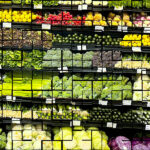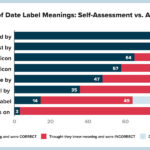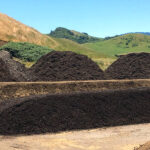Over a dozen composting sites accept food waste, sparking expansion of residential, commercial and institutional diversion programs.
Marsha Johnston
BioCycle August 2019
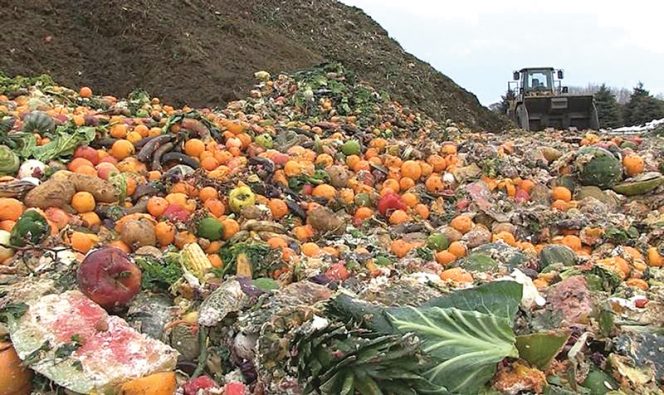
The Solid Waste Agency of Lake County is promoting food scraps collection to help boost recycling. Midwest Organics Recycling in Wauconda Township is where many of the scraps are taken. Photo courtesy of Lake County/Jeff T. Carlstone
In January 2015, the Illinois Food Scrap Coalition (IFSC) presented a comprehensive report with critical findings on the challenges and solutions associated with food scraps composting in Illinois to outgoing Governor Pat Quinn and the Illinois General Assembly (see “Growing A Food Scrap Composting Infrastructure In Illinois,” March/April 2015). Since then, the quantity of food scraps composted has grown significantly, from approximately 28,000 tons to approximately 120,085 tons in 2017.
In 2016, the Illinois Environmental Protection Agency (IEPA) began requiring its permitted composters to report specifically the quantity of food scraps they were composting, rather than all organics more generally. From 2016 to 2017, data from six compost manufacturers showed food scraps composted jumped 18.9 percent by weight, according to the IEPA and its annual reports. The number is likely to have been higher, as not all of the processors who accept food scraps are able to provide a separate quantity because it arrives commingled with yard trimmings. Data from 2018 is not yet available.
The increase in organics collections has resulted from a series of significant policy changes over the past 20 years, notes the Illinois Environmental Council. These include:
• Landscape waste banned from landfills in Illinois in 1990.
• Permit requirements for commercial food scrap composting were reduced in 2009, allowing permitted composting facilities to add up to 10 percent food scraps to the yard trimmings they process without needing additional permitting.
• Permit requirements removed in 2013 for urban farms and other operations with “no more than 25 cy of landscape waste, composting material or end product on-site at any one time and is not engaging in commercial activity.” These sites register with the IEPA and follow local laws.
• In 2015, HB437 passed to allow temporary and permanent sites to collect organics for composting.
“Going from 45 permitted composting facilities only taking yard trimmings to 12 to 14 adding food scraps happened through a lot of work done by IFSC members supporting policy and infrastructure change,” recalls Jennifer Nelson, IFSC board member and education committee chair and senior program manager for Seven Generations Ahead. “Illinois has better infrastructure, more municipalities offering residential food scraps collection, and more institutions composting their organics or having their organics hauled to a commercial processor,” she adds. As of July 2019, Illinois had 47 municipalities offering food scraps collection.
“Six years ago, most experts in the Midwest said Illinois would never have residential food scraps composting or institutional composting, but things have changed,” says Nelson. “Getting a program going in Illinois is happening and affordable, and that’s new. It’s a big step for Illinois.”
Haulers Service Demand
Another important piece in Illinois, notes Nelson, is haulers. “Haulers are recognizing a demand from their customers, mostly institutional and commercial. Many of the solid waste agencies in Illinois are educating about how to incorporate food scraps into contracts with haulers.”
For municipalities, she adds, organics collection started and continues as a voluntary project: “We don’t have any organics diversion mandated statewide, just the 1990 ban on yard waste from landfills, so it is up to municipalities, institutions and businesses to set their own specific goals.” Some offer it year-round, such as Oak Park, on a subscription basis. (Oak Park has a 10% participation rate.) Others offer it at no charge as a seasonal ride-along with yard trimmings collection. (Hauler Lakeshore Recycling Systems estimated a participation rate of 1% to 3%.)Seven Generations Ahead received funding from Food:Land:Opportunity, via a grant from the Searle Funds at The Chicago Community Trust, to work with IFSC to develop “Residential Food Scrap Composting: A Guide for Illinois Municipalities.” The guide is intended to help municipalities negotiate with their hauler, and engage and educate residents.
“We are early in the process in the Midwest, asking people to pay more for a service with value people do not understand,” notes Nelson. While the enthusiasm of municipalities and schools for offering composting to their residents and students is important for education, she adds, the feedstocks they provide are often not of the highest quality. “To make food scrap composting work economically, Illinois will have to keep engaging institutions and large foodservice providers, such as hospitals, grocery stores and produce distributors,” says Nelson.
Even with food scrap composting infrastructure and cost challenges, institutions, restaurants and schools, including the University of Illinois at Chicago Medical Center, Lake County Adult Corrections, and the Field Museum, have food scraps composting programs, as well as zero waste initiatives. The IFSC has a voluntary recognition program called We Compost. To date, We Compost has recognized 43 businesses, 11 grocery stores and farmers markets, 47 municipalities, 12 organizations and institutions, 49 restaurants and caterers, and 54 universities and schools.
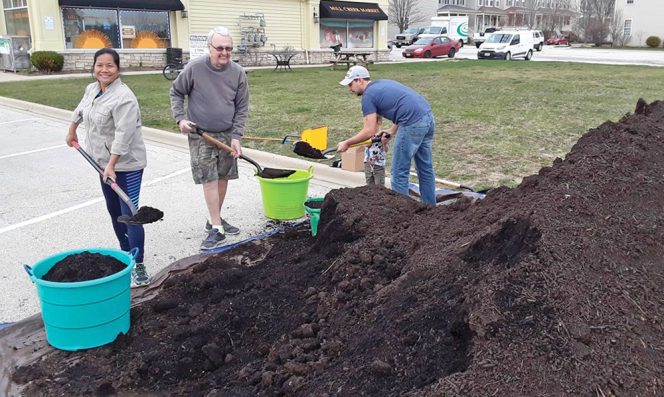
Community events, like this one in Kane County, help spread the word about the availability of food scrap-amended compost. Photo courtesy of Illinois Food Scrap Coalition
Compost Markets
One of the biggest challenges in Illinois, notes Nelson, is building markets for finished compost. “The IFSC Compost Market Development Committee is focused on discovering and publicizing key applications for food scrap-amended compost, from landscape design to large-scale agriculture,” she says. “It also raises awareness among potential buyers of compost and organizes opportunities for companies and individuals to purchase food scrap amended compost made in Illinois.”
In 2018, Public Act 100-0951 was passed, requiring the Illinois Department of Transportation (IDOT) to conduct two pilot demonstrations using compost amended soil that meets the Seal of Testing Assurance level standards and then report the findings. The first of the IDOT Pilot Projects has begun for the improvement of an intersection in McHenry County. Approximately 3,000 cubic yards of compost is to be utilized on this project which will include construction of a roundabout, erosion control features, and planted areas. The second project has recently been selected and will include a building demolition and reconfiguration.
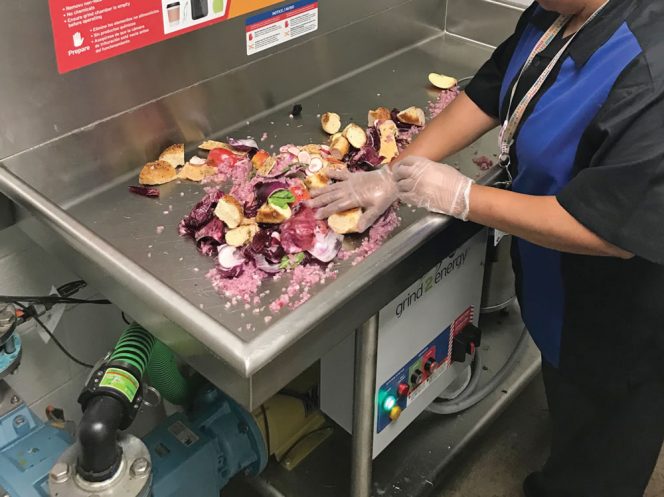
McCormick Place, North America’s largest convention center, installed a Grind2Energy food waste recycling system as part of its full circle sustainability program, which is led by SAVOR … Chicago, the venue’s exclusive foodservice operator. Photo courtesy of Bright Beat
Institutions On Front Lines Of Change
McCormick Place, North America’s largest convention center, installed a Grind2Energy food waste recycling system in May 2019. This has enhanced McCormick Place’s full-circle sustainability program — led by SAVOR… Chicago, the venue’s exclusive food service operator — which includes recycling, composting, surplus food donations to neighborhood charities, and a rooftop garden that utilizes nutrient-rich, food-amended compost to maximize the plants’ healthy growth. Doug Bradley, SAVOR’s Vice President of Culinary, sees a broadening interest in organic waste feedstocks, and hopes to maximize the value of SAVOR… Chicago’s preconsumer food waste by tapping into and contributing to the local processing system and infrastructure.
In the last 90 days, 372 gallons (11.7 tons) of its food waste slurry has been transported to a Net Zero wastewater treatment plant in the Chicago region, where all of its energy consumption is offset by on-site power generation via biogas produced through its anaerobic digestion process. “I imagine a day when food scraps are an energy-producing commodity for which generators will be paid,” notes Bradley. “I can think of few better ways to increase the proper disposal of compostable material than to transform it into an income stream.”
Marsha W. Johnston, an editor with Earth Steward Associates, is a Contributing Editor to BioCycle. Stephanie Katsaros, founder of Bright Beat, and Jennifer Nelson of Seven Generations Ahead, contributed to this article. Bright Beat specializes in large-scale sustainability solutions for corporations, events, facilities and municipalities (www.brightbeat.com).



